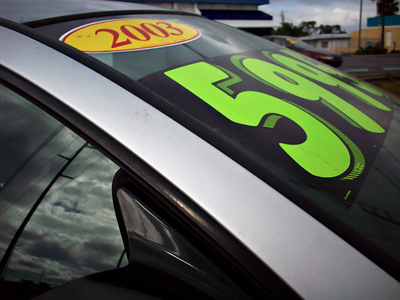 Later today, the Senate will convene and resume consideration of the conference report to accompany the Wall Street Reform and Consumer Protection Act of 2010 (H.R. 4173), intended to strengthen consumer protection in the wake of the national economic crisis. What’s noteworthy about the legislation is not just what would be included within it, but also what would be excluded.
Later today, the Senate will convene and resume consideration of the conference report to accompany the Wall Street Reform and Consumer Protection Act of 2010 (H.R. 4173), intended to strengthen consumer protection in the wake of the national economic crisis. What’s noteworthy about the legislation is not just what would be included within it, but also what would be excluded.
In the bill’s original concept, car dealerships would have been monitored by the newly created Consumer Financial Protection Bureau, similar to the way banks will now be monitored. Roughly 80% of the $850 billion in current auto loans within the U.S. were brokered by the dealerships themselves, which many believed made it appropriate for the dealerships to fall under similar consumer protection laws as banks.
The dealers managed to achieve exemption from this policing, however, by being excluded from the bill. Ed Tonkin, National Automobile Dealers’ Association (NADA) chairman, said, “Dealers are not banks, and we shouldn’t be subject to bank rules.”
President Barack Obama even released a rare personal statement opposing the dealers’ efforts, saying that an exemption would allow auto dealers “to inflate rates, insert hidden fees into the fine print of paperwork, and include expensive add-ons that catch purchasers by surprise.” President Obama’s caution did not seem to sway either chamber of Congress, though.
This is one example amongst several in recent months that proves the collective lobbying clout of car dealerships. Another notable instance was when General Motors and Chrysler were pressured to reconsider the termination of 3,400 dealers as part of the court-supervised, taxpayer-financed restructuring of the two carmakers. Congress set up an arbitration process for the discussions.
Rep. John Campbell (R-CA), a member of the House of Representatives financial services committee, said, “Dealers are an effective force in Washington because all 435 of us have car dealers in our districts.” Campbell, who is also a former car dealer himself, added, “Almost every member of Congress knows a few car dealers personally.” The owners of car dealerships are often wealthy, independent businesspeople with deep economic and social ties to their communities through measures such as localized philanthropy. Those connections translate into votes.
One of the ways that the dealers have been flexing their lobbying muscle is with regular “fly-ins,” where numerous car dealers from across the country appeal to Congress via in-person visits, phone calls, emails, newspaper ads, and campaign donations. The efforts are organized by NADA, an organization that has more than 17,000 members. As Stephen Manning and Marcy Gordon wrote for the Associated Press, “Such phone calls and visits aren’t required to be reported as lobbying.”
Dealers for U.S. and foreign car manufacturers spent a combined $5.64 million on lobbying in 2009. NADA spent $540,000 in overall lobbying dollars for the first quarter of 2010, as compared to $570,000 in the same period of 2009, or $896,000 in the quarter before that.
“They’ve consistently played the lobbying angle, the campaign-finance angle and the grass-roots angle in pressuring members of Congress,” said Paul Herrnson, director of the University of Maryland’s Center for American Politics and Citizenship. “And regardless of who runs the administration… members of Congress listen to their constituents,” he continued.
Bernard Simon quotes an unnamed congressional aide in a recent Financial Times piece:
Contrasting the dealers’ clout to the problems faced by Wall Street investment banks, oil companies and even Detroit carmakers in Washington, the congressional aide notes that when it comes to lobbying in the current political climate, “the closer you get to Main Street, the better you’re going to do”.
Upcoming issues expected to draw further sway from the dealers include the federal tax code, vehicle safety standards, and clean air legislation.
On a related note, Rep. Campbell is one of several Congress members under scrutiny by the Office of Congressional Ethics (OCE), according to The Washington Post. The OCE is investigating fundraisers held and donations received within 48 hours of the December 11 vote on the Wall Street Reform and Consumer Protection Act. The OCE will not confirm or comment on the ongoing investigation.
Sources:
- “Car dealers show range of lobbying powers,” FT.com (The Financial Times), 07/14/10
- “Car Dealers Close to Winning Exemption From Consumer Law,” The Wall Street Journal, 06/24/10
- “Car dealer group spends $540,000 on 1Q lobbying,” Associated Press, 06/23/10
- “Auto dealers, local banks avoid consumer oversight,” Associated Press, 07/08/10
- “Army Has ‘Strong Concerns’ on Auto-Dealer Exemption,” The Wall Street Journal, 05/13/10
- “Masters of Main Street,” The New Yorker, 07/12/10
- “8 House members investigated over fundraisers held near financial reform vote,” The Washington Post, 06/16/10
- Image by dno1967, used under its Creative Commons license.
For more than 40 years, TheCapitol.Net and its predecessor, Congressional Quarterly Executive Conferences, have been teaching professionals from government, military, business, and NGOs about the dynamics and operations of the legislative and executive branches and how to work with them.
Our custom on-site and online training, publications, and audio courses include congressional operations, legislative and budget process, communication and advocacy, media and public relations, testifying before Congress, research skills, legislative drafting, critical thinking and writing, and more.
TheCapitol.Net is on the GSA Schedule, MAS, for custom on-site and online training. GSA Contract GS02F0192X
TheCapitol.Net is now owned by the Sunwater Institute.
Teaching how Washington and Congress work ™

